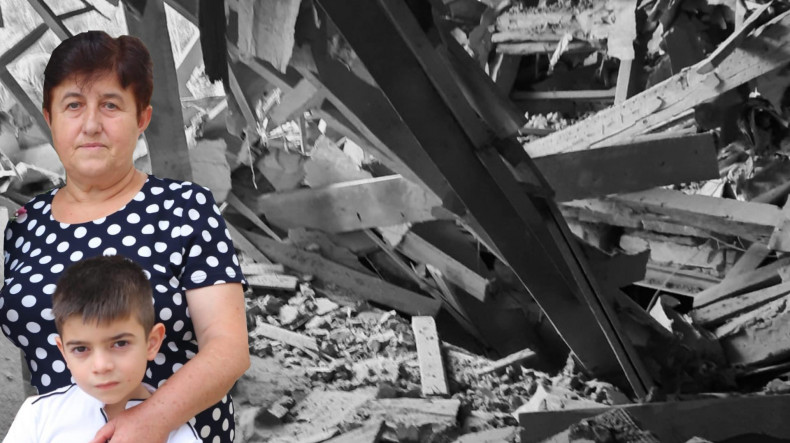Artsakh ethnic cleansing: Azerbaijani rocket killed Armenian grandmother, grandson

On September 19, 2023, Azerbaijan unleashed an attack on Artsakh after blockading the region from the outside world for nine months. Azerbaijan’s military shelled civilian communities and military targets. Twenty-one civilians, including six children, were killed as per official Armenian government data. Two more civilians died in car crashes while trying to avoid the shelling.
Zhulieta Galstyan (61) and her grandson Areg Gasparyan (9), were killed in their house in the village of Horatagh by an Azerbaijani rocket, the investigative media outlet Hetq reported.
Areg’s uncle, Arthur Gasparyan, was in the same room with his mother and Areg during the shelling. Arthur’s wife, his two children, and sister-in-law were in the neighboring room. The roof of Gasparyans’ house was destroyed, and Areg and Zhulieta were trapped under the rubble.
“After the shelling, I immediately called my neighbor and cousin and tried to pull their bodies out of the rubble,” says Arthur.
After pulling their bodies from under the rubble, it was clear they were dead.
On the day of the attack, Areg went to school as usual.
Arthur had been working in the field when nearby explosions were heard around 1 pm. At first, they thought that demining was taking place. However, with the intensifying sound of the explosions, they realized that military actions had started.
At the time, most civilians were at work, and children were at school. When they realized what was happening, some went to the school to bring the children home, while others started walking to Martakert to take cover.
On the day of the attack, the children of Arthur’s brother Hakob were also at school. When they came home, their grandmother went to check on them․
“My brother’s house is just a few meters away from ours. We thought it would be safer if we were together, so his wife and children came to our house. We have a semi-basement floor in our house, which is where we took cover during the 44-day war as well,” recalls Arthur.
Zhulieta was sixty-two. She was a nurse and had worked as a military nurse in the village’s artillery regiment before retiring in 2023. Her husband had participated in Artsakh’s first war and was killed in Mataghis in 1992.
After moving his family members’ bodies to Martakert, Artur returned to the village and went to the school’s shelter, thinking it would be safer there. He regrets not going there at the start of the attack.
“Perhaps everything would be better, and this wouldn’t have happened,” he says.
On September 20, the morning after the shelling, Arthur’s family had to flee their village as Azerbaijani forces had closed in. The family went towards Stepanakert’s airport.
“They said the Russians were organizing queues to evacuate people, but we soon realized that wasn’t the case. We decided to return to our village via Drmbon’s road, but found it blocked by Azerbaijanis. We had to turn back to Stepanakert,” he recalls.
On September 23, Hakob brought his mother’s and son’s bodies to the village and buried them with the help of some villagers.
The village was completely emptied on September 24th.
After arriving in Yerevan, the family tried to arrange for their remains to be transferred to Armenia but have not succeeded.
“Back then, the Red Cross told us it was possible to transfer them, but now we’re uncertain whether it will happen or not,” says Artհur.
Their family currently rents lodgings in Yerevan. They haven’t decided whether they are going to stay in Armenia, or not.

Comments are closed.